|
|
|
Sort Order |
|
|
|
Items / Page
|
|
|
|
|
|
|
| Srl | Item |
| 1 |
ID:
113173
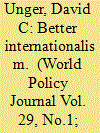

|
|
|
|
|
| Publication |
2012.
|
| Summary/Abstract |
Genoa-Internationalism has many different meanings, but constructive global citizenship should always be at its core. An internationalist foreign policy for the developed countries would use their wealth, economic might, and military power to promote a better, more peaceful, more prosperous world for everyone.
|
|
|
|
|
|
|
|
|
|
|
|
|
|
|
|
| 2 |
ID:
098463
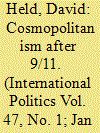

|
|
|
|
|
| Publication |
2010.
|
| Summary/Abstract |
Thinking about the future of humankind and the basis of political association in the early years of the twenty-first century does not give grounds for optimism. In particular, 9/11 has become a moment associated with a return to empire, geopolitics, political violence and the primacy of sovereignty. Yet, it is easy to overstate the meaning of 9/11 and exaggerate from one set of historical experiences. This article explores the ways in which the twentieth century set down key political and legal 'cosmopolitian steps' toward a transformation of the global order. These steps are explored and defended, and it is shown how they created the grounds for a very different response to 9/11 to the one persued by President Bush and Prime Minister Blair. Although clearly this opportunity has been temporarily lost, the failure of the Blair-Bush War on Terror reaffirms strong reasons for further developing a cosmopolitian global order.
|
|
|
|
|
|
|
|
|
|
|
|
|
|
|
|
| 3 |
ID:
151640
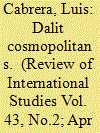

|
|
|
|
|
| Summary/Abstract |
Besides stating that global or cosmopolitan citizenship is an incoherent concept in the absence of a global state, some critics assert that it represents a form of Western-centric moral neoimperialism. This article develops some responses to such objections through examining the efforts of Indian activists who have undertaken intensive international engagement in their struggles against caste discrimination. The National Campaign on Dalit Human Rights has sought to close domestic rights-implementation gaps for Dalits (formerly called untouchables) in part through vertical outreach to United Nations human rights bodies. This mode of outreach is shown to represent an important practice of global citizenship, and to challenge a view of South agent as primarily passive recipients of moral goods within a global citizenship frame. Further, the Dalit activists’ global citizenship practice is shown to be significantly ‘institutionally developmental’, in that it highlights implementation gaps in the global human rights regime and can contribute to pressures for suprastate institutional transformation and development to address them. NCDHR actions are, for example, highly salient to the recently renewed dialogue on creating a World Court of Human Rights.
|
|
|
|
|
|
|
|
|
|
|
|
|
|
|
|
| 4 |
ID:
173689
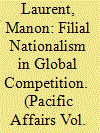

|
|
|
|
|
| Summary/Abstract |
In the early 2000s the Chinese government initiated a profound shift in how it sought to represent China at home and abroad. Whereas many scholars and China watchers argue that a newly assertive China emerged in the wake of the 2008-economic crisis, I argue that this shift took place in the curriculum reforms nearly a decade earlier. An analysis of the evolution of textbooks used for primary Mandarin instruction shows that, starting in 2001, textbooks were developed to inculcate a perennial bond between an increasingly globalized population and its motherland. Specifically, I show how the emergence of “filial nationalism” was crafted in Mandarin-language textbooks, laying the groundwork for a new generation of Chinese youth to simultaneously feel pride for and loyalty to the motherland while preparing them for integration into a globalized world.
|
|
|
|
|
|
|
|
|
|
|
|
|
|
|
|
| 5 |
ID:
107983
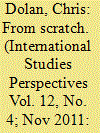

|
|
|
|
|
| Publication |
2011.
|
| Summary/Abstract |
This article advances a blueprint for small colleges interested in implementing new international studies programs. In response to a call from its strategic plan, the faculty at Lebanon Valley College (LVC) recently approved an IS program with two concentrations (international affairs and comparative culture) emphasizing core and advanced elective courses, foreign language, study abroad, as well as undergraduate research, and internship experiences. This article frames the undergraduate international studies program within the broader context of the prevailing literature and identifies the potential advantages and drawbacks of initiating and directing the major and minor. It then provides a brief discussion of the ways in which the program can be assessed and a general overview of the career opportunities available to majors. The article concludes by recommending that small colleges like LVC have the potential to prepare students for the responsibilities of global citizenship when international studies programs are designed to incorporate and maximize college-wide strengths.
|
|
|
|
|
|
|
|
|
|
|
|
|
|
|
|
| 6 |
ID:
105411
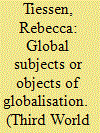

|
|
|
|
|
| Publication |
2011.
|
| Summary/Abstract |
Sport for Development and Peace (sdp) has been adopted as a 'development tool' by Western development practitioners and a growing number of development organisations. Sport is frequently referred to as a 'global language' and used to promote international awareness and cross-cultural understanding-two key themes in global citizenship literature. In this paper I examine the language adopted by organisations promoting sdp-specifically, what sdp organisations say they do as well as the nature and implications of their discourses. Drawing on a large and growing body of literature on global citizenship and post-structuralism, and on post-colonial critiques, I argue that sdp narratives have the potential to reinforce the 'Othering' of community members in developing countries and may contribute to paternalistic conceptions of development assistance. In so doing, they weaken the potential for more inclusive and egalitarian forms of global citizenship. The article examines the discourse of sdp organisational material found online and analyses it in the context of broader sport and colonialism literature. The work of SDP organisations is further examined in relation to global citizenship discourse with a focus on the production- and projection-of global subjects, or objects of globalisation, and what this means for development 'beneficiaries'.
|
|
|
|
|
|
|
|
|
|
|
|
|
|
|
|
| 7 |
ID:
128205
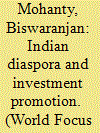

|
|
|
|
|
| Publication |
2014.
|
| Summary/Abstract |
The Indian government's recent high level committee report on the e Indian Diaspora estimates that almost 20 million people of Indian origin live overseas. India has the second largest diaspora in the world. The overseas Indian community estimated at over 25 million is spread across every major region in the world. Some section of the Indian diaspora have acquired global identity and are promoters of the emerging concept of global citizenship.
|
|
|
|
|
|
|
|
|
|
|
|
|
|
|
|
| 8 |
ID:
153676


|
|
|
|
|
| Summary/Abstract |
The UK Government’s International Citizen Service (ICS) sends volunteers abroad to ‘fight global poverty’ as ‘global citizens’. Perhaps unsurprisingly, the construction of development on the ICS programme forecloses important political and historical contexts, resulting in a model of global citizenship we might term ‘soft’. This article presents data from interviews with ICS volunteers with a specific methodological concern of recognizing the agency of young people and allowing their responses to lead discussion. The outcome is a range of themes across the data that critique the Government’s model of citizenship and, I argue, shows the volunteers to be ‘critical’ global citizens. I then ask whether we can consider this a mode of resistance. I conclude with a final data set that – the case is made – presents an imperative to allow these volunteers to have their perspectives on historical and contemporary North–South relations recognized as a critical mode of global citizenship.
|
|
|
|
|
|
|
|
|
|
|
|
|
|
|
|
| 9 |
ID:
146482
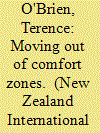

|
|
|
| 10 |
ID:
140322
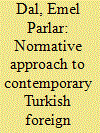

|
|
|
|
|
| Summary/Abstract |
This study explores the cosmopolitanism–communitarianism divide in normative international relations (IR) theory with a special focus on the apparent increasing weight of ethics and morality in Turkish foreign policy. First, it outlines the current debates in normative IR theory with a special focus on the divide between cosmopolitanism and communitarianism. Second, it asks whether Turkey’s foreign policy tradition, both in its discourse and its ethics, leans more toward cosmopolitanism or communitarianism. Then, it examines the slow rise of cosmopolitanism in Turkish foreign policy in the 2000s, with particular reference to the ruling political party in Turkey, the AKP (the Justice and Development Party). Finally, it examines the cosmopolitan/communitarian dilemma that the AKP government faces in the context of the Arab Spring, and specifically the Syrian civil war.
|
|
|
|
|
|
|
|
|
|
|
|
|
|
|
|
| 11 |
ID:
126541
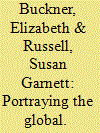

|
|
|
|
|
| Publication |
2013.
|
| Summary/Abstract |
Many have noted the rise of the global in academic and popular discourse. We ask how this global frame of reference has been incorporated into secondary social science textbooks, a realm traditionally dominated by nationalist discourse. Utilizing a data set from more than 500 secondary school textbooks from around the world, spanning 1970-2008, we describe the incorporation of mentions of globalization and global citizenship into textbooks over time and then use a multilevel model to determine the textbook and country-level variables associated with mentions of each. We find that globalization and global citizenship are both predicted by the textbook content's reflection of the external world, including international events and mentions of human rights. However, no cross-national economic or political differences systematically predict incorporation of these topics. We argue that mentions of globalization and global citizenship in textbooks are two manifestations of a world culture that increasingly emphasizes interconnectedness in postnational society
|
|
|
|
|
|
|
|
|
|
|
|
|
|
|
|
|
|
|
|
|